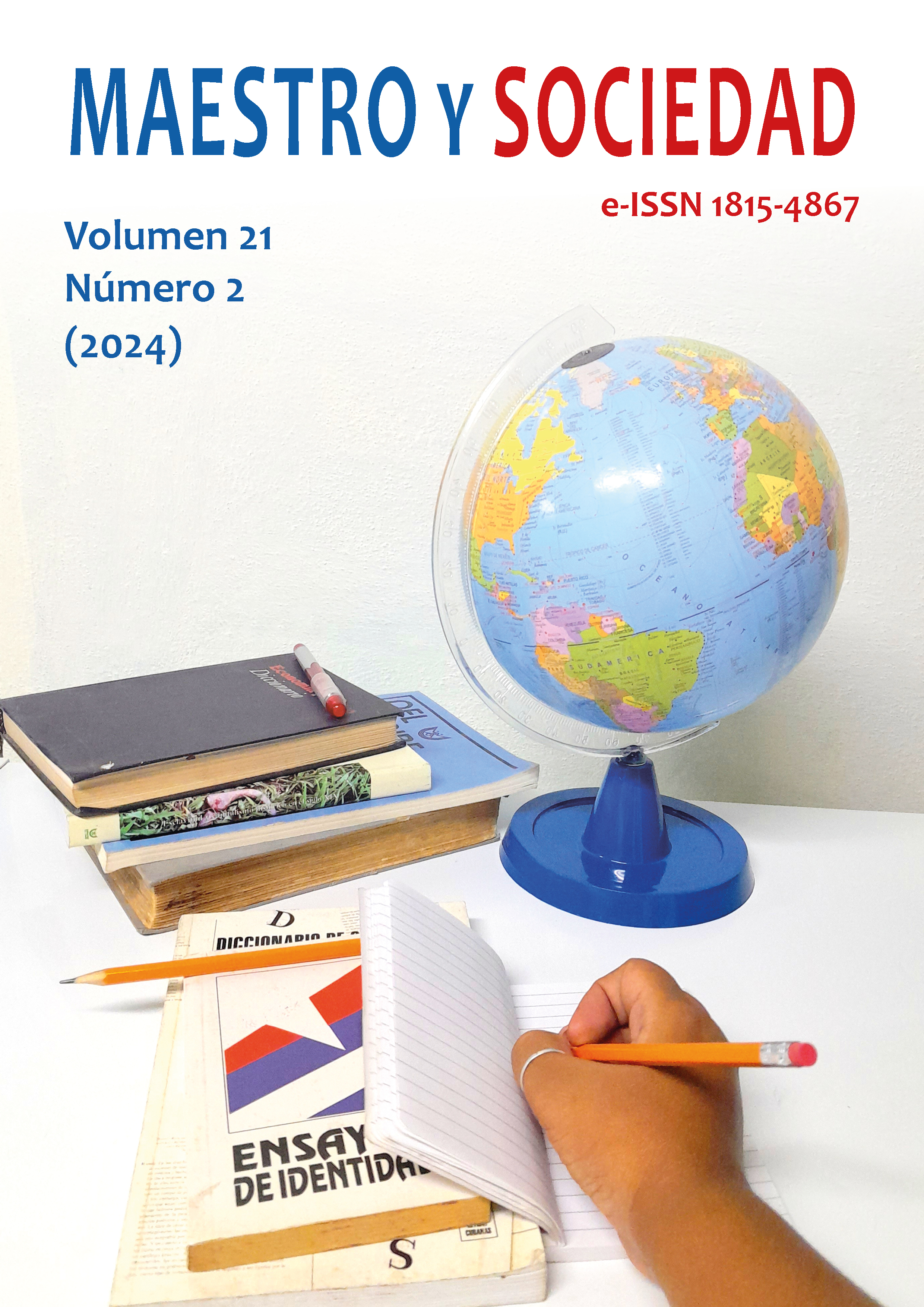School dropout in basic higher sublevel educational processes. “José María Aspiazu y Avilés” educational unitional Unit”
Keywords:
Strategy guide, School dropout, Basic EducationAbstract
Introduction: This research project aims to implement pedagogical strategies to reduce school dropouts in the José María Aspiaz y Avilés Educational Unit. As a basis for the development of the work, the theoretical references of the scientific literature on the factors associated with school dropouts and their treatment within the educational system in Basic Education were systematized, and they highlight the contributions of the authors Lozano and Maldonado (2020). ; Erira and Yarce (2021) and Corzo (2021). Materials and methods: The literature review method was used. Results: The main results of the implementation and evaluation of the educational development project of pedagogical strategies for the reduction of school dropouts in the José María Aspiazu y Avilés Educational Unit, were that with the application of the proposed strategy guide, it decreased in a beneficial percentage of student dropouts in the educational institution, favoring the comprehensive, educational and emotional development of students. Discussion: Growing research into the causes and consequences of school dropouts, along with more accurate reporting on the extent of the crisis, has led to increased public attention on what has been called the silent epidemic. And with that focus comes the possibility of more action at the local, state, and national levels to implement a mix of reforms that will support all students through high school graduation. Conclusions: This proposal allowed us to start with the steps to connect students and parents with the school and then address the structural, programmatic and financing changes, which helped combat this still current scourge.
References
Álvarez & Allein. (04 de Enero de 2021). FACTORES SOCIALES Y CULTURALES QUE INFLUYEN EN LA DESERCIÓN ESCOLAR, PROVINCIA DE PANAMÁ, 2020. https://revistas.up.ac.pa: https://revistas.up.ac.pa/index.php/enfoque/article/view/2164
Ayala. (2017). Paradigma interpretativa. https://www.lifeder.com/paradigma-interpretativo-investigacion/
Córdova, Lara y García. (2017). EL JUEGO COMO ESTRATEGIA LÚDICA PARA LA EDUCACIÓN INCLUSIVA DEL BUEN VIVIR. https://dialnet.unirioja.es/descarga/articulo/6535622.pdf
Curiel, Ojalvo y Cortizas. (07 de Mayo de 2018). La educación socioafectiva en el proceso de enseñanza aprendizaje. http://scielo.sld.cu/pdf/rces/v37n3/0257-4314-rces-37-03-e5.pdf
eluniverso. (16 de Junio de 2021). La pandemia en Ecuador provoca más de 90 mil deserciones escolares. Obtenido de https://www.eluniverso.com: https://www.eluniverso.com/noticias/ecuador/en-ecuador-90-mil-estudiantes-dejaron-de-asistir-a-clase-durante-la-pandemia-nota/
Erira & Yarce. (2021). Deserción escolar desde la experiencia de los adolescentes de una zona rural. Obtenido de http://editorial.umariana.edu.co: http://editorial.umariana.edu.co/revistas/index.php/unimar/article/view/2438
Erira y Yarce. (2021). Deserción escolar desde la experiencia de los adolescentes de una zona rural. Obtenido de http://editorial.umariana.edu.co: http://editorial.umariana.edu.co/revistas/index.php/unimar/article/view/2438
Escandón, et al. (30 de Noviembre de 2021). Deserción académica en educación general básica superior en la ciudad de Piñas y la intervención del trabajador social. Obtenido de https://ciencialatina.org: https://ciencialatina.org/index.php/cienciala/article/view/1161
Gómez, et al. (14 de Septiembre de 2016). Deserción escolar de adolescentes a partir de un estudio de corte transversal: Encuesta Nacional de Salud Mental Colombia 2015. Obtenido de http://www.scielo.org.co: http://www.scielo.org.co/pdf/rcp/v45s1/v45s1a14.pdf
Hernández. (2017). Metodología de la investigaicón. Obtenido de https://www.uca.ac.cr: https://www.uca.ac.cr/wp-content/uploads/2017/10/Investigacion.pdf
Hernández, Álvarez y Arana. (2017). EL PROBLEMA DE LA DESERCIÓN ESCOLAR EN LA PRODUCCIÓN CIENTÍFICA EDUCATIVA. Obtenido de Revista In
Hernández, et al. (2017). EL PROBLEMA DE LA DESERCIÓN ESCOLAR. Obtenido de Revista Internacional de Ciencias Sociales y Humanidades SOCIOTAM: https://www.redalyc.org/pdf/654/65456040007.pdf
Herrera. (2019). Estrategias y Técnicas didácticas para la enseñanza de la Física para la Carrera de Pedagogía de las Ciencias Experimentales, Matemática y Física, de la Facultad de Filosofía, Letras y Ciencias de la Educación, de la Universidad Central del Ecuador. Obtenido de UNIVERSIDAD CENTRAL DEL ECUADOR. FACULTAD DE FILOSOFÍA, LETRAS Y CIENCIAS DE LA EDUCACIÓN. CARRERA DE MATEMÁTICA Y FÍSICA: http://www.dspace.uce.edu.ec/bitstream/25000/19990/1/T-UCE-0010-FIL-621.pdf
Ledesma. (2018). Elementos para el diseño de estrategias didácticas.Coordinación de la instrumentación de la RIEMS en el Bachillerato Tecnológico. En L. V. México: RIEMS.
Martínez & Ortega. (2018). LA PROBLEMÁTICA ACTUAL DE LA DESERCIÓN ESCOLAR, UN ANÁLISIS DESDE LO LOCAL. Obtenido de http://biblioteca.utec.edu.sv: http://biblioteca.utec.edu.sv/siab/virtual/elibros_internet/55796.pdf
Maturano y Soliveres. (31 de 08 de 2021). ESTRATEGIAS COGNITIVASY METACOGNITIVAS EN LA COMPRENSIÓNDE UN TEXTO DE CIENCIAS. Obtenido de https://www.raco.cat: https://www.raco.cat/index.php/Ensenanza/article/download/21831/21665
Mayancela. (2016). Causas de la deserción escolar de los estudiantes de Básica Superior y Bachillerato de la Unidad Educativa Comunitaria Intercultural Bilingue Quilloac. Obtenido de https://dspace.ups.edu.ec: https://dspace.ups.edu.ec/bitstream/123456789/13234/1/UPS-CT006844.pdf
Molinero y Chávez. (15 de Mayo de 2020). Herramientas tecnológicas en el proceso de enseñanza-aprendizaje en estudiantes de educación superior. Obtenido de http://www.scielo.org.mx: http://www.scielo.org.mx/scielo.php?script=sci_arttext&pid=S2007-74672019000200005
Pachay & Rodríguez. (15 de Diciembre de 2020). La deserción escolar: Una perspectiva compleja en tiempos de pandemia. Obtenido de https://polodelconocimiento.com: https://polodelconocimiento.com/ojs/index.php/es/article/download/2129/4239
Peña, et al. (Septiembre de 2016). La influencia de la familia en la deserción escolar: estudio de caso en estudiantes de secundaria de dos instituciones de las comunas de Padre las Casas y Villarrica, Región de la Araucanía, Chile. Obtenido de http://www.scielo.org.mx: http://www.scielo.org.mx/scielo.php?script=sci_arttext&pid=S1405-66662016000300881
Reynosa. (02 de Febrero de 2020). Estrategias didácticas para investigación científica: relevancia en la formación de investigadores. Obtenido de Revista Universidad y Sociedad: http://scielo.sld.cu/scielo.php?script=sci_arttext&pid=S2218-36202020000100259
Ruiz, et al. (13 de Diciembre de 2016). La relación bullying-deserción escolar en bachilleratos rurales. Obtenido de https://redie.uabc.mx: https://redie.uabc.mx/redie/article/view/1527/1655
Ruiz, et al. (2021). Factores que incidenen la deserción escolar. Obtenido de https://repository.uaeh.edu.mx: https://repository.uaeh.edu.mx/revistas/index.php/tepexi/article/view/6440/7735
Sánchez, García, Steffens y Hernández. (Junio de 2019). strategias Pedagógicas en Procesos de Enseñanza y Aprendizaje en la Educación Superior incluyendo Tecnologías de la Información y las Comunicaciones. Obtenido de https://www.scielo.cl: https://www.scielo.cl/scielo.php?script=sci_arttext&pid=S0718-07642019000300277
Venegas, Chiluisa, Castro, Casillas. (29 de Abril de 2017). LA DESERCIÓN EN LA EDUCACIÓN. Obtenido de https://revista.redipe.org: https://revista.redipe.org/index.php/1/article/viewFile/240/237
Vivanco. (12 de 06 de 2020). ncidencia de los factores personales, ambientales, y de interacción social en la deserción escolar en educación a distancia –virtual. Obtenido de Universidad Andina Simón Bolívar, Quito, Ecuador: https://revistadigital.uce.edu.ec/index.php/CATEDRA/article/view/2279/3338
Published
How to Cite
Issue
Section
License
Copyright (c) 2024 Gina Manuela Macías Zambrano, Karina Elizabeth Narváez Ramos, María Elena García Mero, Keyla Guadalupe Gallo Saldarriaga

This work is licensed under a Creative Commons Attribution-NonCommercial-NoDerivatives 4.0 International License.
This journal provides immediate open access to its content, based on the principle that offering the public free access to research helps a greater global exchange of knowledge. Each author is responsible for the content of each of their articles.



























 Universidad de Oriente
Universidad de Oriente 